Swindon delgates report back from Cairo anti-war conference
Andy newman | 02.01.2004 21:46 | Anti-militarism | Globalisation
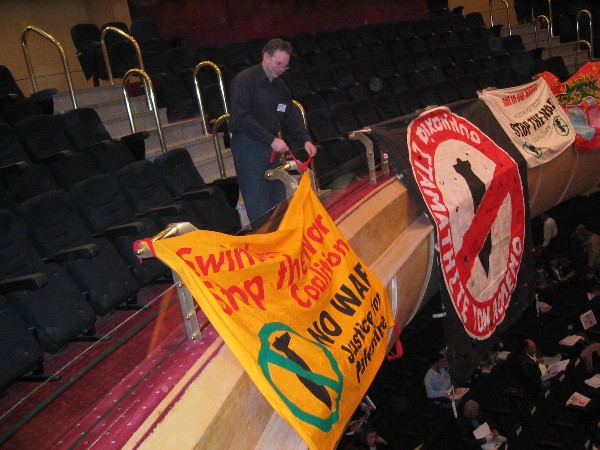
displaying the Swindon Stop the War banner in the conference hall.
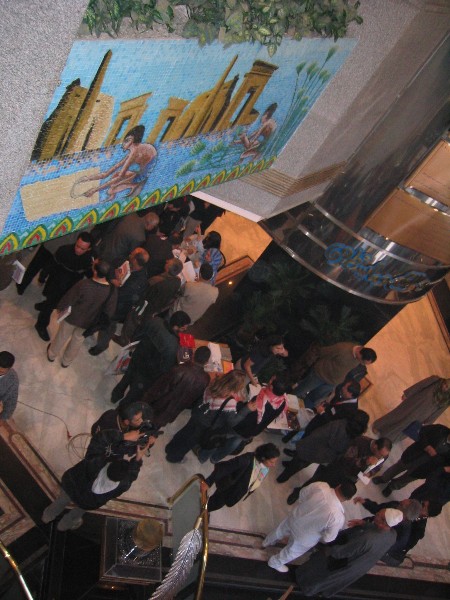
view of deleagtes networking during break in the Journalists Institute
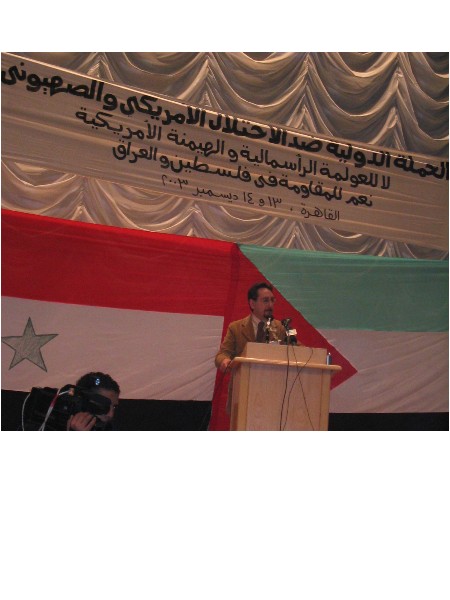
John Reess of Stop the War Colaition speaking in main session
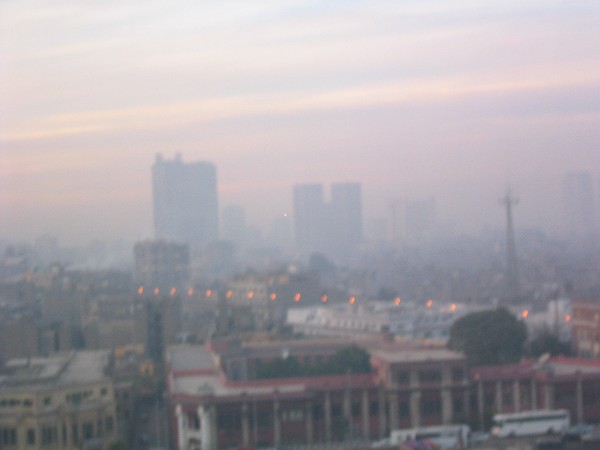
Cairo is really polluted!!
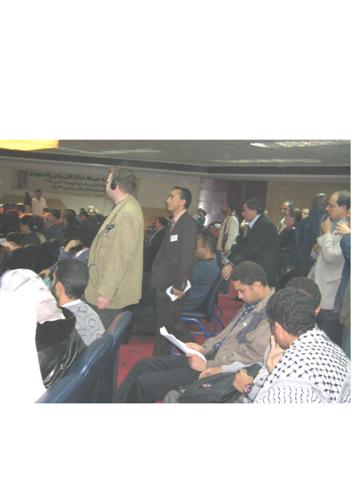
Andy Newman of Swindon StWC listening during final session
“The capture of Saddam Hussein was announced during the conference and it caused uproar, because a minority of the Arab nationalists there supported Hussein, whereas obviously most people know he is a vile butcher. However all the Arabs seemed to resent seeing Saddam publicly humiliated on television. A number of speakers argued that because the invasion of Iraq was illegal then capture of President Hussein is also illegal, and is effectively kidnapping or vigilantism. It is a nonsense fro the Americans to talk of the trial being by Iraqis as the only power in the land is the US, and the only Iraqis they trust are traitors, collaborators and Quislings. Former US Attorney General Ramsey Clark spoke at the conference and pointed out that even the Nazi war criminals at Nuremburg were treated with more respect. It is all about US prime time TV images, and nothing to do with justice for the victims of Halabja or elsewhere.”
The conference was very widely reported in the Arab press and TV, and the government had 500 armed police outside. Someone said the only reason it wasn't banned was because it included every single opposition group in Egypt, and a lot of international attention. People are routinely tortured and imprisoned in Egypt for speaking out, so even holding the conference was a major achievement. The broad range of the conference and the radicalism of its final declaration were also remarkable.
Speakers in the main session included the former Labour MP Tony Benn, the former United Nations humanitarian coordinator for Iraq Denis Halliday, George Galloway MP, and John Rees from the Stop the War Coalition and Moslem activist Salma Yaqoob from Birmingham.
THE conference released a declaration, calling for opposition to globalisation and US power, supporting all forms of resistance in Iraq and Palestine, including military resistance. It agreed to establish an international committee to continue the campaign over the coming weeks and months.
There is a picture of the Swindon delagates in the third row in Socilaist Worker:
 http://www.socialistworker.co.uk/1882/07.pdf
http://www.socialistworker.co.uk/1882/07.pdf The following is the text of the paper I presented in the workshops on "popular movements"
Only a Mass Movement Can Succeed: (lessons from the campaign against using a British military base to bomb Iraq)
Andy Newman, delegate from Swindon and Wiltshire GMB Union branch.
I am secretary of the Swindon Stop the War Coalition. Swindon is an industrial town of around 180000 people in a mainly rural part of England. Just ten miles north of Swindon is RAF Fairford, base for the B52 bombers that bombed Iraq.
The full number of bombs dropped on Iraq from Fairford is not yet known, but up until 28th April there were three bombing flights a day and around 4 convoys of bombs per week were taken to the base, and these are known to have included cluster bombs. Use of the base to bomb Iraq was extremely unpopular in the area. In the lead up to war an opinion poll in the local paper (Swindon Evening Advertiser) showed 88% of local people against the war, although this is probably an exaggeration.
Britain plays an important military role for the US in providing airstrips for the USAF heavy bomber fleet. Outside of the United States these heavy bombers can fly from Guam in the Pacific, Fairford in the UK and Diego Garcia in the Indian Oceans. To use either Fairford or Diego Garcia the USAF needs the express permission of the British government. These forward bases outside the US give the USAF heavy bomber coverage of most of the world's populated surface, and with one refuelling they can bomb anywhere on the planet.
The controversial use of Fairford to bomb Iraq therefore posed a strategic and tactical challenge for the British anti-war movement that is of general interest.
The strategy of the Stop the War Coalition, following the 400000 strong London demonstration on 27th September 2002, was to use the size and power of the national demonstration to go back into our local communities to build big local events, and then use these as a springboard for an even larger national demonstration, which we achieved with 2 million on 15th February. This meant consistent local work to prosecute the argument about the war through every forum available to us, in the workplaces, trade unions, schools, colleges, mosques and churches; and by forcing debate with pro-war politicians in the local newspapers and radio. (Anti-war literature was also being distributed in military bases around Swindon). In turn the size of the February 15th protest made it possible to plan civil disobedience, strikes and occupations if war broke out. This happened but unfortunately not on quite a sufficient scale to deter Blair. One small example from the Swindon area is worth reporting. In the village of Market Lavington 300 school students protested on 19th March, led by a 15 year old girl whose father was serving with the British army in the Gulf, many of the pupils involved in the protest have fathers in the armed forces, and this protest symbolizes for me the crisis that the Stop the War campaign had created in the British establishment. We know that we nearly succeeded, that Blair considered resigning, and that the US was prepared to attack Iraq alone.
As part of this strategy of building the movement in the local communities there were a couple of demonstrations at Fairford, mainly involving people from the most local towns. 300 protested in December, and around 500 in February. A small number of mainly local people also started camping outside the base as a “peace camp”
However, across the UK a tiny number of activists became obsessed with trying to disrupt the operation of RAF Fairford. They were emboldened by a slight success of pulling the gates open with ropes during the protest in February, and at the same time a handful managed to get onto the runway (The base was unmanned at the time, except by British police, the USAF planes only arrived a couple of weeks later).
One problem with this strategy of disruption and sabotage was that it was direct challenge to the power and prestige of the British state by a very small number of peace activists. The government would be prepared to do anything to stop them succeeding. A number of protesters were arrested under anti-terrorist and other legislation by the police, and inside the perimeter fence the US army and British Ghurka soldiers (mercenaries from Nepal incorporated into the British army) were authorized to use lethal force. The local chiefs of police (Chief constables for Wiltshire and Gloucestershire) were recently awarded The “US Air Forces in Europe Medal of Distinction” for preventing protesters disrupting the use of the base, in a police operation costing over £7.3 million.
The second problem was that the proponents of sabotage counterpoised this to the strategy of the Stop the War Coalition. Through e-mail lists and discussion groups, and at meetings within the anti-war movement they argued that the StWC strategy of mass demonstrations and winning the argument with the wider population was not succeeding, and the only alternative was for the small number of the most committed activists to undergo special training for “direct action” to stop the war. Because these activists were unable to win a democratic majority for their views within the movement various slanders were circulated including red-baiting attacks on organisations and individuals in the movement.
The issue came to a head on 22nd March. On the Saturday following war breaking out the Stop the War Coalition organized a massive demonstration in London. Those activists obsessed with Fairford declined to cancel a demonstration that had been organized for the same day at Fairford. E-mail lists boasted that there would be serious and not just symbolic action to stop the use of the base.
In the event the 22nd March demonstration in London attracted 500000, making it the largest ever wartime demonstration in Britain. It was reported around the world and was a major blow to Tony Blair’s credibility. In contrast, barely 3000 attended the Fairford protest, and the police intercepted and stopped activists from London. There were nearly as many police as protesters, and the demonstration was therefore herded safely along a country lane. Of the 3000, a majority were from local towns, some of whom would have preferred to go to London but felt it necessary to support a demonstration on their own doorstep.
To conclude, one reason for the strength of the antiwar movement in Britain is that we have built where we are strong. We want direct action, but to be effective that must involve the masses and not just a self-selected elite of activists. Activists engaging in sabotage must necessarily cut themselves off from democratic debate, and once isolated they are an easy target for state repression. Strikes, occupations and mass demonstrations hurt the government – these are built by activists well rooted in their workplaces and communities, who are therefore much stronger.
Andy newman
 e-mail:
swindon@stopwar.org.uk
e-mail:
swindon@stopwar.org.uk
 Homepage:
http://freespace.virgin.net/swindon.stopwar/index.htm
Homepage:
http://freespace.virgin.net/swindon.stopwar/index.htm
Comments
Display the following 9 comments